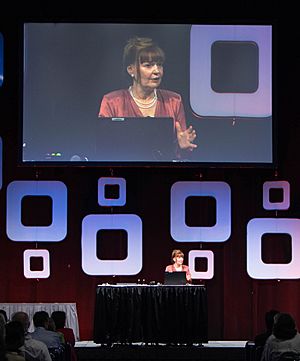Carol Robinson facts for kids
Quick facts for kids
Dame Carol Robinson
|
|
|---|---|

Carol Robinson presenting John Fenn Lecture 2023
|
|
| Born |
Carol Vivien Bradley
10 April 1956 |
| Nationality | British |
| Education |
|
| Alma mater |
|
| Awards |
|
| Scientific career | |
| Fields | |
| Institutions | |
| Thesis | Structural studies on bioactive organic compounds (1982) |
Dame Carol Robinson is a famous British chemist. She was born on April 10, 1956. She even led the Royal Society of Chemistry from 2018 to 2020!
She is a top professor at the University of Oxford, where she teaches about physical and theoretical chemistry. She also helped start the Kavli Institute for Nanoscience Discovery at Oxford. Before that, she was a professor at the University of Cambridge.
Contents
Early Life and Learning Journey
Carol Vivien Bradley was born in Kent, England. When she was 16, she left school. She started working as a lab technician at a company called Pfizer. There, she began using a new method called mass spectrometry.
People quickly saw how smart she was. She took evening classes and studied more while still working at Pfizer. After getting her first degree, she went on to earn a Master's degree at the University of Swansea. Then, she got her PhD at the University of Cambridge in just two years!
Amazing Discoveries and Career
After finishing her studies, Carol Robinson worked at the University of Bristol. Later, she joined the University of Oxford. There, she started studying how proteins fold. Proteins are tiny building blocks in our bodies.
Carol and her team found a way to watch proteins fold. They used mass spectrometry to study proteins in a gas form. This was a huge step forward in understanding how proteins work.
Breaking Barriers in Science
Dame Carol Robinson made history! She was the first woman to become a chemistry professor at both the University of Cambridge (in 2001) and the University of Oxford (in 2009).
Her research has pushed the limits of mass spectrometry. She showed that even large, complex molecules like proteins can be studied in a gas. This helps scientists understand how these molecules are built.
Understanding Proteins
Besides protein folding, Carol Robinson has done important work on ribosomes and molecular chaperones. Ribosomes help make proteins, and chaperones help proteins fold correctly. More recently, she has studied membrane proteins. These are proteins found in the outer layer of cells.
Her work has greatly helped the field of structural biology. This is about understanding the shapes of molecules. Her research helps find new medicines. She also helped start a company called OMass Therapeutics. This company uses mass spectrometry to discover new drugs.
Awards and Special Recognitions
Dame Carol Robinson has received many awards for her amazing work.
- In 2003, she won the Biemann Medal.
- In 2004, she became a Fellow of the Royal Society (FRS). This is a very high honor for scientists. She also received the Rosalind Franklin Award.
- In 2008, she received the Christian B. Anfinsen Award.
- In 2010, she was given the Davy Medal. This was for her new way of using mass spectrometry to study large protein groups.
- In 2011, she won the Interdisciplinary Prize from the Royal Society of Chemistry. She also received the Aston Medal and the FEBS/EMBO Women in Science Award.
Becoming a Dame
In 2013, she was made a Dame Commander of the Order of the British Empire (DBE). This is a special title given by the British Queen or King. It was for her great contributions to science and industry.
More Honors
- In 2014, she received the Thomson Medal Award.
- In 2015, she won the L'Oréal-UNESCO For Women in Science Award. This was for her groundbreaking work on large molecules and studying proteins in gas.
- In 2017, she was chosen as a Foreign Associate of the US National Academy of Sciences.
- In 2018, she won an award from the American Chemical Society.
- In 2019, she received the Novozymes Prize and the Royal Medal.
- In 2020, she was given the Othmer Gold Medal.
- In 2021, she received the 2022 Louis-Jeantet Prize for Medicine and the 2022 European Chemistry Gold Medal. She also became an International Honorary Member of the American Academy of Arts and Sciences.
- In 2022, she was awarded the Franklin Institute Award for Chemistry.
- In 2023, she was elected to the American Philosophical Society. She also received the John B. Fenn Award. She was named one of the top ten "Innovators and Trailblazers" by the Analytical Scientist.
- In 2024, she received the EPO European Inventor Lifetime Achievement Award. She also received an honorary doctorate from the University of Cambridge.
She has received 13 honorary doctorates from universities around the world. These include the Weizmann Institute of Science, Aarhus University Denmark, University of Kent, the University of York, and the University of Bristol.
 | Emma Amos |
 | Edward Mitchell Bannister |
 | Larry D. Alexander |
 | Ernie Barnes |

